Mechanisms of acquired resistance to endocrine therapy in hormone-dependent breast cancer cells
- PMID: 17616457
- PMCID: PMC2147683
- DOI: 10.1016/j.jsbmb.2007.05.008
Mechanisms of acquired resistance to endocrine therapy in hormone-dependent breast cancer cells
Abstract
Acquired resistance is a major problem limiting the clinical benefit of endocrine therapy. To investigate the mechanisms involved, two in vitro models were developed from MCF-7 cells. Long-term culture of MCF-7 cells in estrogen deprived medium (LTED) mimics aromatase inhibition in patients. Continued exposure of MCF-7 to tamoxifen represents a model of acquired resistance to antiestrogens (TAM-R). Long-term estrogen deprivation results in sustained activation of the ERK MAP kinase and the PI3 kinase/mTOR pathways. Using a novel Ras inhibitor, farnesylthiosalicylic acid (FTS), to achieve dual inhibition of the pathways, we found that the mTOR pathway plays the primary role in mediation of proliferation of LTED cells. In contrast to the LTED model, there is no sustained activation of ERK MAPK but enhanced responsiveness to rapid stimulation induced by E(2) and TAM in TAM-R cells. An increased amount of ERalpha formed complexes with EGFR and c-Src in TAM-R cells, which apparently resulted from extra-nuclear redistribution of ERalpha. Blockade of c-Src activity drove ERalpha back to the nucleus and reduced ERalpha-EGFR interaction. Prolonged blockade of c-Src activity restored sensitivity of TAM-R cells to tamoxifen. Our results suggest that different mechanisms are involved in acquired endocrine resistance and the necessity for individualized treatment of recurrent diseases.
Figures
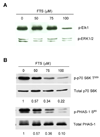

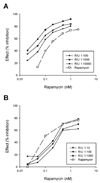
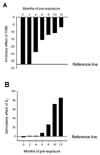

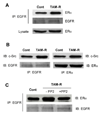

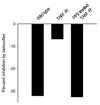
References
-
- Baum M, Budzar AU, Cuzick J, Forbes J, Houghton JH, Klijn JG, Sahmoud T, Group AT. Anastrozole alone or in combination with tamoxifen versus tamoxifen alone for adjuvant treatment of postmenopausal women with early breast cancer: first results of the ATAC randomized trial. Lancet. 2002;359:2131–2139. - PubMed
-
- Goss PE, Ingle JN, Martino S, Robert NJ, Muss HB, Piccart MJ, Castiglione M, Tu D, Shepherd LE, Pritchard KI, Livingston RB, Davidson NE, Norton L, Perez EA, Abrama JS, Therasse P, Palmer MJ, Pater JL. A randomized trial of letrozole in postmenopausal women after five years of tamoxifen therapy for early-stage breast cancer. New Engl. J. Med. 2003;349:1793–1802. - PubMed
-
- Encarnacion CA, Ciocca DR, McGuire WL, Clark GM, Fuqua SAW, Osborne CK. Measurement of steroid hormone receptors in breast cancer patients on tamoxifen. Breast Cancer Res. Treat. 1993;26:237–246. - PubMed
-
- Brunner N, Frandesen TL, Holst-Hansen C, Bei M, Thompson EW, Wakeling AE, Lippman ME, Clarke R. MCF7/LCC2: a 4-hydroxytamoxifen resistant human breast cancer variant that retains sensitivity to the steroidal antiestrogen ICI 182,780. Cancer Res. 1993;53:3229–3232. - PubMed
MeSH terms
Substances
Grants and funding
LinkOut - more resources
Full Text Sources
Other Literature Sources
Medical
Research Materials
Miscellaneous

